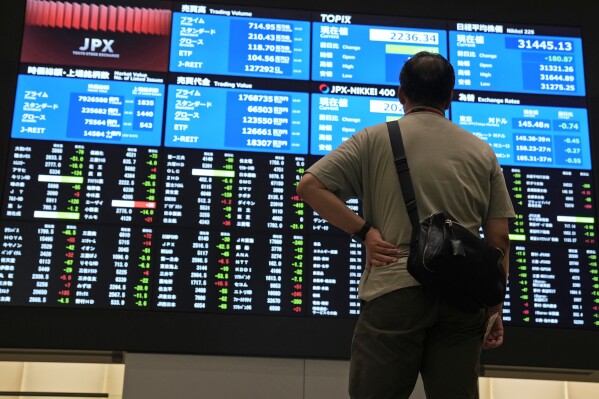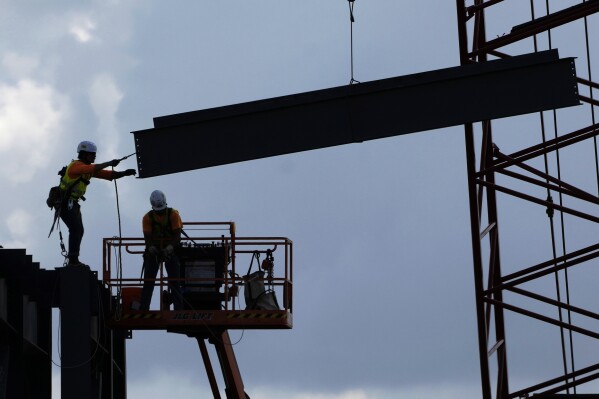Stock market today: Asian markets lower after Japanese factory activity and China services weaken
BEIJING (AP) — Asian stock markets were mostly lower Thursday after Japanese factory activity and Chinese service industry growth weakened.
Shanghai, Hong Kong and Seoul declined. Tokyo gained. Oil prices edged lower.
Wall Street’s benchmark S&P 500 index rose 0.4% on Wednesday after the U.S. government cut its estimate of economic growth for the second quarter to a still-robust level.
Traders hope that and this week’s updates on hiring and consumer inflation will convince the Federal Reserve prices are under control and no more interest rate hikes are needed.
 US economic growth for last quarter is revised down to a 2.1% annual rate
US economic growth for last quarter is revised down to a 2.1% annual rate
 Stock market today: Asian markets lower after Japan factory activity, China services weaken
Stock market today: Asian markets lower after Japan factory activity, China services weaken
 Job vacancies, quits plunge in July in stark sign of cooling trend in the US labor market
Job vacancies, quits plunge in July in stark sign of cooling trend in the US labor market
Official data showed Japanese factory activity shrank by 2% from the previous month in July. A survey of Chinese service industries showed activity weakened in July but still was expanding.
“Things could be worse. But markets are not likely to take too much comfort from this set of data,” said Rob Carnell of ING in a report.
The Shanghai Composite Index lost 0.6% to 3,119.06 while the Nikkei 225 in Tokyo advanced 1% to 32,669.98. The Hang Seng in Hong Kong declined 0.3% to 18,419.98.
The Kospi in Seoul was 0.4% lower at 2,550.40 and Sydney’s S&P-ASX 200 gained 0.1% to 7,305.00.
India’s Sensex opened down less than 0.1% at 65,071.31. New Zealand and Singapore advanced while Bangkok and Jakarta declined.
A monthly index of Chinese service industries declined to 51 from June’s 51.2 on a 100-point scale on which numbers above 50 show activity growing. A separate manufacturing index improved to 49.7 but still showed activity contracting.
Chinese economic growth slid to 0.8% over the previous quarter in the three months ending June from the January-March quarter’s 2.2%. Exports have contracted and retail spending is weak.
The latest figures suggest Asia’s biggest economy is not “definitively growing,” said Stephen Innes of SPI Asset Management in a report. “These figures might not sufficiently reassure the markets.”
On Wall Street, the S&P 500 advanced Wednesday to 4,514.87. It is down from this year’s peak in July but still up 17.6% for the first eight months of 2023.
The Dow Jones Industrial Average added 0.1% to 34,890.24. The Nasdaq gained 0.5% to 14,019.31. It’s up nearly 34% for the year.
Technology stocks led gains. Apple rose 1.9% and Palo Alto Networks rose 1.7%. HP lost 6.6% after cutting its profit forecast.
The U.S. government cut its second-quarter economic growth estimate for an annual rate of 2.1% from 2.4%. That still is up from 2% during the first quarter.
Traders hope the the Fed can pull off a “soft landing,” or bringing inflation under control without tipping the U.S. economy into recession. The central bank held rates steady at its last meeting. Investors expect the same at its meeting in September.
On Thursday, the government will release an inflation update with a report on personal consumption and expenditures. The PCE is the inflation measure the Fed watches most closely. It eased to 3% in July from last year’s peak of 7%.
On Friday, the government’s monthly employment report for August will cap a heavy week of updates.
In energy markets, benchmark U.S. crude oil lost 1 cent to $81.62 per barrel in electronic trading on the New York Mercantile Exchange. It rose 47 cents on Wednesday to $81.63. Brent crude, the price basis for international oil trading, shed 1 cent to $85.23 per barrel in London. It gained 37 cents the previous session to $85.86.
The dollar declined to 145.97 yen from Wednesday’s 146.20 yen. The euro edged down to $1.0919 from $1.0923.
Disclaimer: The copyright of this article belongs to the original author. Reposting this article is solely for the purpose of information dissemination and does not constitute any investment advice. If there is any infringement, please contact us immediately. We will make corrections or deletions as necessary. Thank you.






